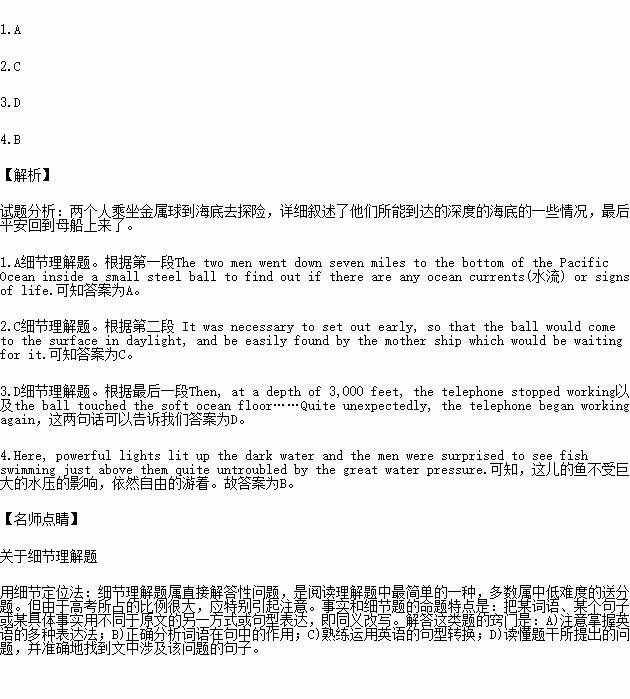题目内容
The journey two divers made some time ago to the deepest point on the earth makes us realize how much of the world still remains to be studied. The two men went down seven miles to the bottom of the Pacific Ocean inside a small steel ball to find out if there are any ocean currents(水流) or signs of life.
It was necessary to set out early, so that the ball would come to the surface in daylight, and be easily found by the mother ship which would be waiting for it. The divers began preparations early in the morning and soon afterwards, when all was ready, the steel ball disappeared under the surface of the water.
The divers felt as if they were going down steps as they passed through warm and cold layers (层) of water. In time the temperature dropped to the freezing point. They kept in touch with the mother ship by telephone telling how they felt. Then, at a depth of 3,000 feet, the telephone stopped working and they were quite cut off from the outside world. All went well until some four hours later at 30,000 feet, the men were frightened by a loud, cracking noise. Even the smallest hole in the ball would have meant instant death. Luckily, though, it was only one of the outer windows that had broken. Soon afterwards, the ball touched the soft ocean floor raising a big cloud of "dust" made up of small dead sea creatures. Here, powerful lights lit up the dark water and the men were surprised to see fish swimming just above them quite untroubled by the great water pressure. But they did not dare to leave the lights on for long, as the heat from them made the water boil. Quite unexpectedly, the telephone began working again and the faint but clear voices of the divers were heard on the mother ship seven miles away. After a stay of thirty minutes the men began their journey up, arriving three hours later, cold and wet through, but none was worse for their experience.
1.The purpose of the divers' journey to the deepest point on the earth was to find _______.
A. if there are water currents, and life in the great depths
B. if people can stand the severe cold in the great depths
C. if there are steps in the great depths
D. if the telephone works well in the great depths
2.The divers set out early in the morning so that .
A. they could avoid the cold at night
B. they could see at the bottom of the ocean
C. they could return to the surface during the day
D. they could stay long at the bottom
3.As the divers went down to the ocean floor, the telephone .
A. kept working all the time
B. stopped working at a depth of 3,000 feet and began working again when they returned to the same depth
C. stopped working at a depth of 3,000 feet and began working again at 30,000 feet
D. stopped working at a depth of 3,000 feet and began working again after they reached the bottom
4.On the ocean floor, the divers found that .
A. there was no life but some small dead sea creatures
B. fish were swimming as freely as they do near the surface
C. fish were not swimming freely in the dark water
D. fish were not swimming freely under the high water pressure

